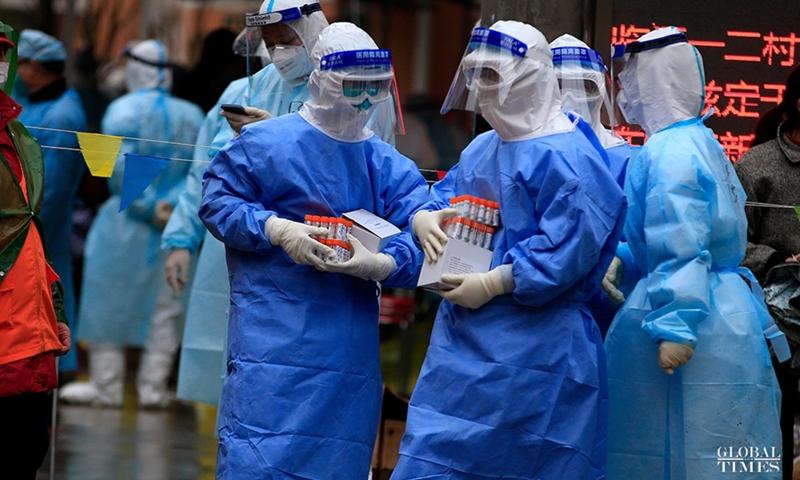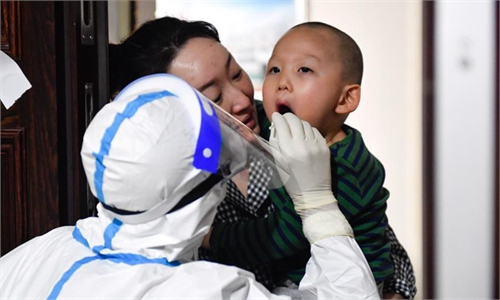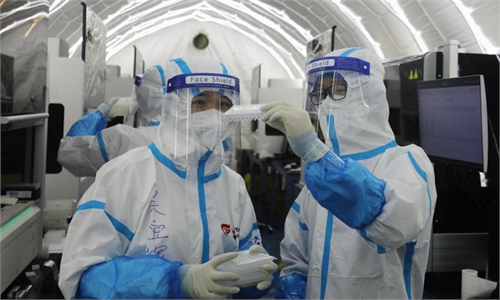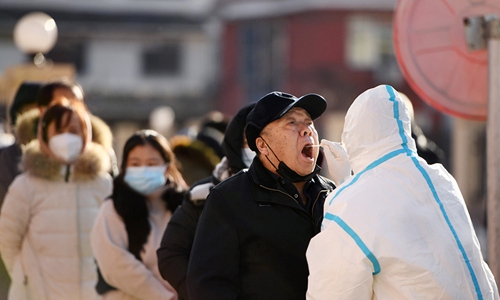China’s COVID-19 test fees 'fraction of US'
Govt cuts costs to ease public pressure ahead of festival travel rush

Medical workers give residents in Shanghai nucleic acid tests. Photo:Yang Hui/GT
Despite booming demand for nucleic acid tests, especially as the travel rush of the Spring Festival holidays nears, Chinese health authorities and local governments have managed to keep fees below world standards. The fee per person can be about 50-80 yuan ($7.78-12.4), with some locations even offering it for free through inclusion in public medical insurance.
Public institutions in 13 provincial-level regions including Beijing, Tianjin, Hubei, Heilongjiang and Tibet, have lowered their testing fees. In nine provinces, the maximum fee at public institutions was cut to 80 yuan, according to media reports.
Beijing health authorities said on Thursday that they would cut the price for the third time from 80-120 yuan per sample to 20-80 yuan, starting immediately, and the fee may fall further.
Some areas, such as Chongqing Municipality, offer tests for free. According to the official WeChat account of the Chongqing government on Saturday, 38 yuan out of the 50-yuan fee will be covered by medical insurance and the rest will be paid by the local financial department.
Lower prices will ease public pressure on testing, Zeng Yixin, deputy director of the NHC, told a press conference on Wednesday.
Previously, prices of nucleic acid tests ranged from 100-200 yuan. But based on the calculation of just 100 yuan per sample, the testing service market will reach 60 billion yuan this year, industry experts said.
A manager surnamed Shi at Da An Gene of Sun Yat-sen University, based in South China's Guangdong Province, told the Global Times on Sunday that "the price of one set of test kits is about 20-30 yuan," depending on the province.
In stark contrast, prices in the US range aren't regulated, and they from a few dozen dollars to $1,000, media reports said.
Prices are also high in the Taiwan island. In the Chinese mainland, private-sector tests cost a few dozen yuan, and large-scale "batch testing" is generally free. But in the island, local media say the test fee is usually NT$7,000 ($250), compared with an average monthly income of NT $38,000.
Prices should be lower since the kits are all made of low-cost inputs and there are few technical barriers, Tao Lina, an industry analyst, told the Global Times on Sunday.
Tao said prices are high in the US and some other markets because the mainland is doing mass production and testing of nucleic acid kits, together with government purchasing and coordination, which combine to keep prices reasonable.
Also, China uses the tests as a screening measure, including for asymptomatic people. But in the US, where the pandemic is out of control, the test is often used as a diagnostic measure instead of mass screening, which makes prices higher, said Tao.
The mainland has continued to cut kit prices to ensure wider access ahead of the Spring Festival travel rush. Most travelers should have a negative nucleic acid test taken within the previous seven days before returning home.
It is estimated that 1.7 billion trips will be taken during the rush this year, up more than 10 percent from 2020, according the Ministry of Transport said on January 20.
In response, production is being pushed up. "Ordinarily, we make about 1 million kits a day, but now it's 4-5 million," said Shi.
Test prices are likely to fall further as the illness is managed more like the flu, and every hospital will likely set up testing facilities, analysts said.



